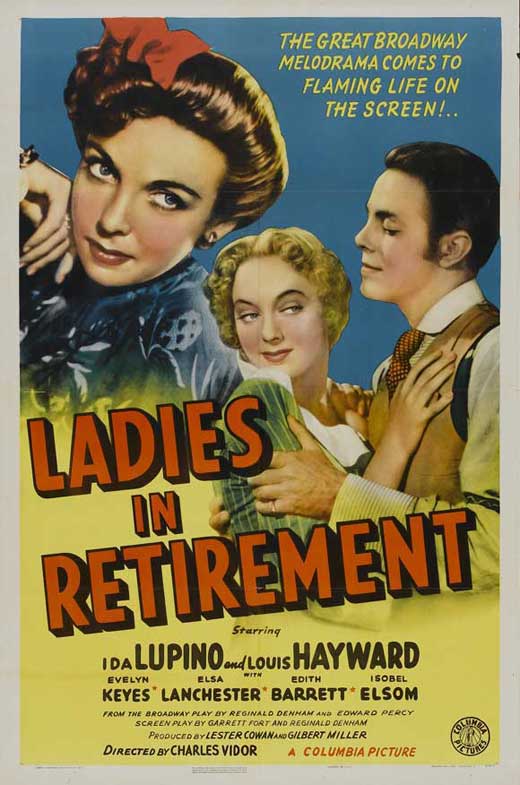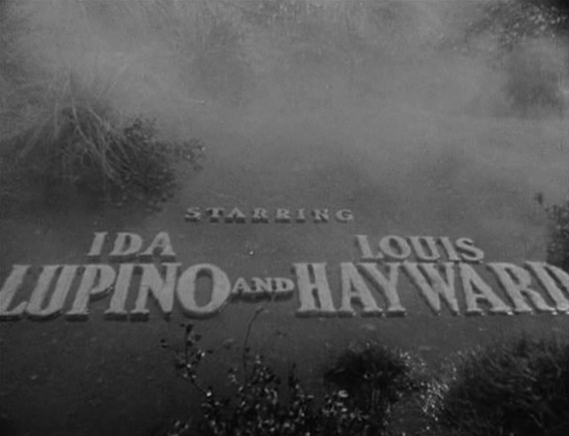The Furniture: Into the Marshes with Ida Lupino and Elsa Lanchester
 Monday, February 5, 2018 at 2:00PM
Monday, February 5, 2018 at 2:00PM "The Furniture," by Daniel Walber, is our weekly series on Production Design. You can click on the images to see them in magnified detail.
 This week marks 100 years since the birth of pioneering director and actress Ida Lupino. Twitter has been full of tributes to her work, including the eight feature films she directed. We've discussed a few of her films here before as well. For my part, I highly recommend her two episodes of The Twilight Zone.
This week marks 100 years since the birth of pioneering director and actress Ida Lupino. Twitter has been full of tributes to her work, including the eight feature films she directed. We've discussed a few of her films here before as well. For my part, I highly recommend her two episodes of The Twilight Zone.
However, I’m going to look at a movie from before she made the leap to directing, the only one in her filmography to receive a Best Art Direction nomination. 1941’s Ladies in Retirement is both a thriller and a play adaptation, a genre we don’t see too often anymore. But in that era it was fairly common, from comedies like Arsenic and Old Lace to the more explicitly malevolent Night Must Fall and Gaslight.
The setting of Ladies in Retirement, according to Reginald Denham and Edward Percy’s original play, is the “Living Room of an Old House on the Marshes of the Thames Estuary Some Ten Miles to the East of Gravesend, 1885.”
Of course, this being 1941, a location shoot in Kent would have been impossible even if the studio had wanted it. Instead, the marshes were built into a sound stage. The team was so proud of their ersatz swamp that they even set the opening credits in the muddy water!
Then we arrive at the house, a towering Tudor with a tall and pointy roof. It suggests wealth, certainly, but its odd proportions also recall the witches’ homes of fairytales.

The owner, however, is no malevolent sorceress. Miss Leonora Fiske (Isobel Elsom) is a happily retired chorus girl, enjoying the peace and quiet of the marshes. Ellen Creed (Lupino) is her housekeeper, secretary and companion. But their pleasant lives are interrupted by a letter from London. Ellen’s eccentric sisters, Emily (Elsa Lanchester) and Louisa (Edith Barrett) have been evicted from their home. Ellen discreetly asks Miss Fiske if they may visit the marshes for a few days.
Once they arrive, of course, Ellen has no intention of ever sending them away. This drives a wedge between Ellen and Miss Fiske, leading to the narrative twists and turns that one expects from this genre. There follows, inevitably, a murder.
The plot is intriguing enough, but the environment is the real star. These fake marshes have the excessive quality of the era's cartoons. The matte paintings depict a seemingly endless repetition of landscape, interrupted only occasionally by more withered trees. The stormy skies blend with the foggy terrain, a misty barrier that forbids travel to the outside world.
The weird sisters adore this bizarre landscape. This doesn’t make them any easier to live with, mind you, constantly making a mess and shouting at poor Miss Fiske. But it does suggest that their time in the cacophonous urban landscape of London was an utter nightmare.
Moreover, they directly interact with this uncanny landscape more than anyone else. Louisa heads out to a well-placed tree and points her telescope toward the hazy boundary of this place. Does she see anything through the fog? We know she can’t, but even a suggestion can reframe the internal geography of the film.
The same is true of Emily’s obsession with cattails. She brings them into the house to display in a vase, making a mess along the way.
In fact, so much of what drives Miss Fiske mad about the sisters is their clear misunderstanding of the purpose of a house. For her, it keeps us apart from the swirling estuary outside. When they insist upon ignoring this boundary, ushering the marshes into the drawing room, they drive the narrative toward confrontation.
Ellen, inevitably, sides with her sisters. Yet for her, this does not manifest in acts of creative flower arranging. It drives her to a desperate, violent act. She tries to force the transfer of the house from Miss Fiske to herself, but by the law of nature rather than the law of England.
It ends badly, but not before we are given a tremendous visual metaphor for this passage between home and marsh. Ellen passes across the front windows, visible through the patterned curtains. She walks along the line between humanity and nature, just over the edge. As she slowly veers outward, into the wild, we wonder if this could have ended any other way.









Reader Comments (7)
OMG, saw a theatrical screening of this last year and loved it. The art direction is just stunning, even if the material doesn't fully warrant such grand treatment. Thanks for highlighting such an undersung gem.
Saw this movie when I was a small kid and it was old even then... I remember being petrified of it and I guess thought it was a horror movie... the sets were great and cinematography was very good. I would like to see it today.
A beautifully written post - full of penetrating observations that illuminate the joys of this marvelous movie. The whole cast is good. But I'd have singled out Ida for a Best Actress nomination that year. Along with a supporting nod for Isobel Elsom , delivering one of my favorite 40's performances as the mightily imposed upon Miss Fiske. Funny how that poster suggests some farce about naughty Victorian flirts. The tense and ultimately tragic tale audiences got must have given some considerably more than they bargained for.
Terrific post! The brooding atmosphere and sets add just the right touch to give the film a creeping sense of dread.
Louis Hayward isn't that effective but all the actresses are simply great with Ida deserving of an nomination, which of course incredibly never came for any of her work. Therein lies the danger of always being superior, you get taken for granted.
The same could be said for Isobel Elsom who likewise was always terrific and also went without a nomination throughout her career.
Ida Gabe a disasterously bad performance on Charlie’s Angels season one episode I Will be Remembered.
Ha, after reading your piece it makes me wonder if this was a major inspiration for the witch’s hideaway on Penny Dreadful.... now I need to see it!
I love the mores on soundstages, films like The 39 Steps and (obviously) Wuthering Heights. That fog that lingers.